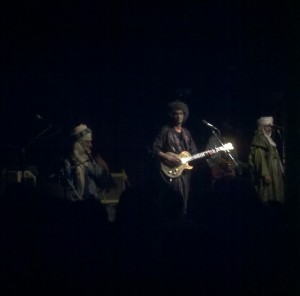Oct 15, 2012 Comments Off on Tinariwen, Paradise, Boston, MA, 10.12.12
Tinariwen, Paradise, Boston, MA, 10.12.12
 A Brief Holiday in Other People’s Misery
A Brief Holiday in Other People’s Misery
Before I went to see Tinariwen the other night, I read up on the political situation in Mali and it is pretty grim. A quarter million people have fled the country since January 2012 and the beginning of the “Tuareg Rebellion,” a conflict fueled in part by the return to Mali of Tuareg fighters who, up to that point, had been in the employ of Muammar Gadddafi.
The Malian government has now long since lost control of the northern part of the country, some of which is controlled by the Tuareg-led National Movement for the Liberation of Azawad, and some of which is controlled by Islamic fundamentalists—the Movement for Oneness and Jihad in Northern Africa and Ansar Dine (under the command of a former Tuareg rebel leader, Iyad Ag Ghaly). The result has been the forced conscription of children, systematic rape, imposition of Sharia law and the disturbing news that fundamentalists are compiling lists of unwed mothers.
Against this backdrop, as I headed out to lose myself in the trancey, guitar-driven desert groove for which Tinariwen has become world-renowned, I was reminded of the opening line from “Holiday in the Sun” by the Sex Pistols, “A brief holiday in other people’s misery.” While that line referred to visiting East Berlin during the Cold War, it seemed to apply just as well to this middle class American seeking entertainment and diversion from guys who every day are wondering and worrying about the fate of their families in a land plunged into unrelenting chaos.
The Absented Messiah
It’s not the case that Tinariwen just happens to be from an African nation that is well on its way to “failed state” status. They have expressed support for Tuareg autonomy in the recent troubles and in fact have been part of Tuareg resistance to the Malian government for decades now. Read the rest of this entry »
